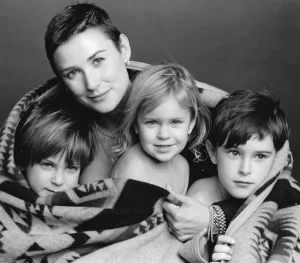Rumer Willis, the eldest daughter of Hollywood legends Demi Moore and Bruce Willis, recently stirred up a mix of emotions and reactions online after making a series of surprisingly candid revelations. During her appearance on the “What in the Winkler” podcast, hosted by Zoe Winkler Reinis, Rumer opened up about some of her most personal and unconventional lifestyle choices—particularly her sleeping and bathing habits. While some listeners praised her honesty and vulnerability, others were caught off guard, unsure of what to make of her statements. Some applauded her authenticity, while others took to social media to express their confusion and disapproval.

One of the most eyebrow-raising confessions came when the 36-year-old actress shared that she still shares a bed with her mother, Demi Moore. Rumer explained that, even as a grown woman and a mother herself, she continues to sleep in the same bed as her mom—and doesn’t find it unusual at all. In fact, she even hopes to maintain a similar bond with her own daughter, 2-year-old Louetta.
“Honestly, I hope Lou will still want to sleep in bed with me when she’s my age,” Rumer said on the podcast. “I still sleep in bed with my mom, and I don’t think it’s weird.” Her matter-of-fact tone sparked a whirlwind of reactions, with some people admiring the closeness between mother and daughter, while others questioned whether such a relationship crosses typical adult-child boundaries.
Rumer went on to explain that her co-sleeping arrangement with her daughter is rooted in a strong maternal instinct and a deep connection. Since Louetta was born, Rumer said she hasn’t spent a single night away from her. She described their bond as natural and instinctual, comparing it to how animals care for their young.
“I co-sleep with Louetta and have not spent a night away from her since she was born,” Rumer shared. “I always think about it like this—imagine if you took a baby gorilla or a puppy when it was just two weeks or even three months old and made it sleep in a different room than its mom. People would look at you like you were crazy. But for some reason, when it’s a human baby, we say, ‘Nope, that kid has to sleep through the night alone. They have to learn how to self-soothe.’ But they can’t even feed themselves yet! It makes no sense.”
This comparison certainly struck a chord, but it also left others puzzled. Rumer’s take challenges long-held parenting norms, especially in Western cultures where independence and early sleep training are often encouraged. While attachment parenting has its advocates, many people online felt that Rumer’s approach was a bit extreme—even for a devoted mom.
But it didn’t stop there. Rumer continued to peel back the curtain on her family’s lifestyle, revealing another habit that left people even more stunned: she occasionally takes baths with her sisters—33-year-old Scout and 31-year-old Tallulah. For Rumer, this wasn’t odd or inappropriate. In fact, she described it as a reflection of the kind of open and loving household she was raised in.
“And that’s just the kind of house that I grew up in,” she explained. “People might think that that’s crazy and weird, but I don’t. It’s normal to me. That’s the way we were raised—very open, very connected. There’s no shame or awkwardness in that. It’s just part of our family dynamic.”
These admissions quickly made their way across the internet, prompting a cascade of reactions. Social media platforms lit up with commentary from fans and critics alike. Some people praised Rumer’s openness and willingness to share deeply personal parts of her life, while others questioned whether such revelations were appropriate—or even necessary.
The podcast’s host, Zoe Winkler Reinis, herself a mother of three, weighed in with her own perspective, supporting Rumer’s approach to co-sleeping. She revealed that she, too, shares her bed with one of her children—her 7-year-old son. “It really just depends on the child,” Reinis said. “My middle kid would never want to sleep with me. If I even try to lie down next to him, he’s like, ‘I’m good, Mom.’ But my youngest is different. He needs to be close to us. And I know that about him. I also know that it’s temporary. This won’t last forever.”
Reinis’s support helped contextualize Rumer’s views, showing that attachment parenting and co-sleeping are not as rare as some might think. However, when it came to Rumer’s comment about bathing with her adult sisters, the internet was less forgiving. Reddit threads popped up almost immediately, with users sharing their thoughts—many of which leaned toward disbelief and discomfort.

One Redditor wrote, “And what’s supposed to happen—in normal, healthy households—is that you grow out of that. You start developing boundaries and a sense of privacy.”
Another added, “So, sooo much less. Why do people feel the need to share this kind of info publicly? Do people just not silently reflect anymore and ask themselves, ‘Is this really something I need to say out loud?’”
Still, some tried to strike a middle ground. “The bathing thing is weird,” one commenter wrote, “but sleeping in the same bed with your kid isn’t, in my opinion. People need to chill.”
This isn’t the first time a celebrity has caused a stir with similar parenting choices. Actress Alicia Silverstone faced criticism not long ago after revealing that she still co-sleeps with her 11-year-old son. Her comments also led to widespread debate, with people both supporting and condemning her approach. It seems that whenever celebrities share unconventional parenting practices, the internet becomes a battleground of opinions.
Yet Rumer Willis doesn’t appear to be fazed by the backlash. In fact, her statements seem to reflect a broader personal philosophy centered on emotional intimacy and open communication within families. Whether it’s sharing a bed or a bath, Rumer emphasized that these rituals are about love, comfort, and connection—not anything inappropriate or sensational.
What stands out in all of this is how differently people interpret these behaviors. To some, Rumer’s actions reflect a deeply bonded family and a supportive environment where affection is freely expressed. To others, it seems to challenge the cultural norms that separate parent and child, siblings, and personal boundaries.

The generational divide may play a role in these reactions as well. In an age where parenting philosophies are constantly evolving—where some parents prioritize independence and structure while others lean into emotional closeness and gentle parenting—Rumer’s story sits squarely in the middle of this cultural tug-of-war.
In many ways, her openness may also help others feel less isolated about their own parenting choices. For mothers who co-sleep with their toddlers, or who maintain close bonds with adult children, hearing someone like Rumer speak out might provide comfort or validation. It reminds people that families come in all shapes and styles, and that what works for one household might not work for another—but it doesn’t necessarily make it wrong.
There’s also something undeniably brave about sharing such private details in a public forum, especially as a public figure. Rumer knew her words would spark discussion—perhaps even criticism—but she chose to share them anyway. That level of transparency, whether people agree with her choices or not, is something that many celebrities tend to avoid for fear of public scrutiny.
As for the bathing comment, while it may not resonate with most people, Rumer’s point remains clear: her family has always been close-knit, and they’ve never been afraid of expressing affection or maintaining physical closeness in a way that feels natural to them.
It’s a reminder that there isn’t a one-size-fits-all model for familial love. Some families thrive on independence and space, while others find strength in closeness and shared routines. The challenge is learning to respect those differences, even if they don’t align with our own values or norms.

In the end, Rumer’s confessions shine a light on how we define intimacy, connection, and the boundaries we draw between family members. They force us to ask ourselves uncomfortable questions: What is normal? Who gets to decide what’s appropriate? And at what point do personal preferences cross into public controversy?
For Rumer, these routines are second nature—part of a lifestyle rooted in love and togetherness. She’s not asking for approval or validation. She’s simply sharing her truth, and in doing so, opening the door for a broader conversation about parenting, privacy, and the many ways we choose to love our families.
Whether or not you agree with her views, one thing is clear: Rumer Willis is unafraid to speak her mind, even when the subject matter might make others uncomfortable. And in today’s world, that kind of honesty is rare—and maybe even a little refreshing.





